The Tensile Testers Market is estimated to be valued at USD 263.8 million in 2025 and is projected to reach USD 450.5 million by 2035, registering a compound annual growth rate (CAGR) of 5.5% over the forecast period.
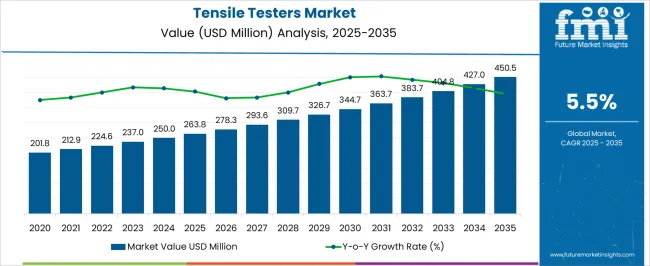
| Metric | Value |
|---|---|
| Tensile Testers Market Estimated Value in (2025 E) | USD 263.8 million |
| Tensile Testers Market Forecast Value in (2035 F) | USD 450.5 million |
| Forecast CAGR (2025 to 2035) | 5.5% |
The Tensile Testers market is experiencing steady growth as demand increases for precise material testing across industrial, automotive, aerospace, and manufacturing sectors. Growth is being driven by the need to ensure material strength, durability, and compliance with regulatory standards, alongside the rising adoption of automation and digital integration in laboratories.
Advanced tensile testing systems enable real-time data collection, high accuracy, and reproducible results, which are critical in quality control and research and development environments. Increasing investments in research infrastructure and the growing focus on materials innovation are contributing to market expansion.
The market outlook is positive, with opportunities expected in portable and software-enhanced testers that offer remote monitoring and advanced analytics As industries increasingly emphasize product reliability and performance optimization, tensile testers are anticipated to remain an essential tool in material characterization and mechanical testing, with continued adoption across both established and emerging markets.
The tensile testers market is segmented by product type, component, application, end users, sales channels, verticals, enterprise size, and geographic regions. By product type, tensile testers market is divided into Universal Testing Machine, Electronic, Electromechanical, Digital, and Others. In terms of component, tensile testers market is classified into Solution and Services. Based on application, tensile testers market is segmented into Tension Testing, Compression Testing, Torque Testing, Flexure Testing, Coefficient Of Friction Testing, Crimp Joint Testing, Shear Testing, Peel Testing, Tear Testing, Crush Testing, Top-Load And Closure Testing, and Others. By end users, tensile testers market is segmented into Quality Control Laboratories, R&D Centers, Metal Industries, and Others. By sales channels, tensile testers market is segmented into Distributors And Resellers, Original Equipment Manufacturers, and Online & Retail Stores. By verticals, tensile testers market is segmented into Manufacturing, Mining, Energy And Utility, Government, Education, Construction, and Others. By enterprise size, tensile testers market is segmented into Large Enterprise and SMEs. Regionally, the tensile testers industry is classified into North America, Latin America, Western Europe, Eastern Europe, Balkan & Baltic Countries, Russia & Belarus, Central Asia, East Asia, South Asia & Pacific, and the Middle East & Africa.
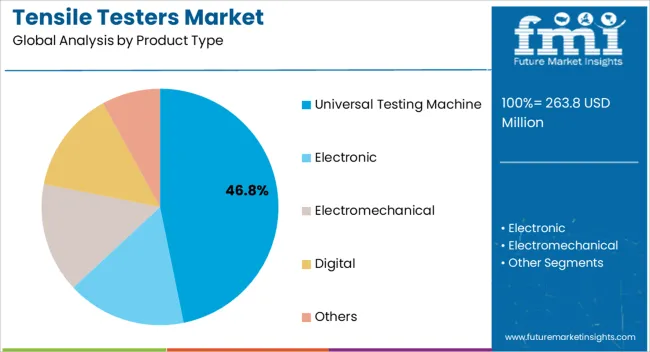
The Universal Testing Machine segment is projected to hold 46.80% of the Tensile Testers market revenue share in 2025, making it the leading product type. This position is being attributed to its versatility in performing a wide range of tests, including tensile, compression, and bending, on diverse materials such as metals, polymers, and composites.
Adoption has been driven by increasing demand from research laboratories and industrial quality control units, where a single machine capable of multiple tests provides operational efficiency and cost savings. Growth has also been supported by the integration of digital control systems, automated fixtures, and data acquisition software, which enhance test accuracy and reproducibility.
Additionally, the robust design of universal testing machines ensures durability in heavy-use environments, making them highly favorable for long-term deployments As industries continue to prioritize precision in material performance assessment, the Universal Testing Machine segment is expected to maintain leadership, reinforced by continuous technological enhancements and rising adoption across multiple sectors.
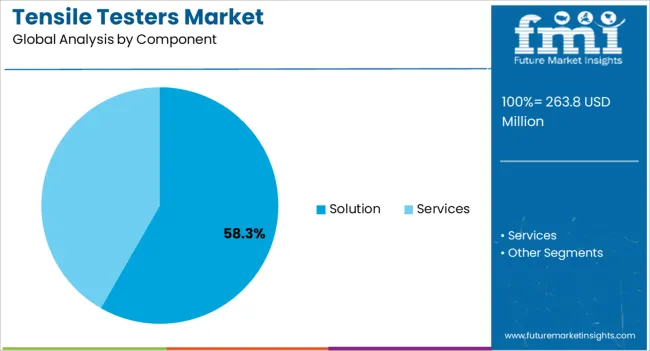
The Solution component segment is anticipated to hold 58.30% of the overall market revenue in 2025, establishing it as the leading component type. This dominance is being driven by the growing requirement for software and digital solutions that enable advanced test management, data analysis, and real-time reporting.
Solutions facilitate seamless integration with laboratory information management systems and enhance the automation of routine testing processes, reducing human error and improving efficiency. Increasing reliance on digital solutions for compliance reporting, traceability, and predictive analytics has contributed significantly to adoption in research and industrial applications.
As the need for smart testing systems continues to rise, solutions that allow customizable test protocols and integration with modern software platforms are increasingly preferred Future growth in this segment is expected to be supported by advancements in cloud-enabled data management, remote monitoring, and AI-assisted analysis, reinforcing the central role of solutions in driving the market.
The Tension Testing application segment is expected to capture 41.70% of the market revenue in 2025, making it the leading application area. This prominence is being attributed to its critical role in assessing material strength, elasticity, and failure limits under tensile loads, which is essential for ensuring safety and performance in engineering and manufacturing sectors.
Growth has been fueled by regulatory requirements that mandate rigorous material testing, as well as increasing investments in research and development to optimize product performance. Tension testing is widely applied across metals, polymers, composites, and construction materials, providing key insights that inform product design and quality assurance.
The adoption of advanced digital and automated systems has further enhanced the precision and reproducibility of tension testing, making it highly reliable for both routine and complex applications Continued emphasis on material performance and industrial compliance is expected to sustain leadership of the tension testing segment, with growing adoption of software-assisted and integrated testing platforms supporting long-term growth.
Tensile testers are used for evaluating the tensile strength of materials and products. They find applications in R&D and quality control laboratories. They are used to ensure the quality of compounds, raw materials and finished products and are used for testing the tensile strength of a wide range of materials, such as metal, rubber, plastic, textile, paper, yarn and wire. The advanced tensile testers provided by the manufactures have various features which can help users to optimize product design.
Moreover, multiple industries are expected to increase the use of the tensile testers to increase productivity as well as to decrease material costs and achieve additional manufacturing objectives. Tensile testers are also used for torque and force measuring applications in metal industries and laboratories. These testers can be categorized on the basis of load capacity, speed, cross travel, power and type of displays.
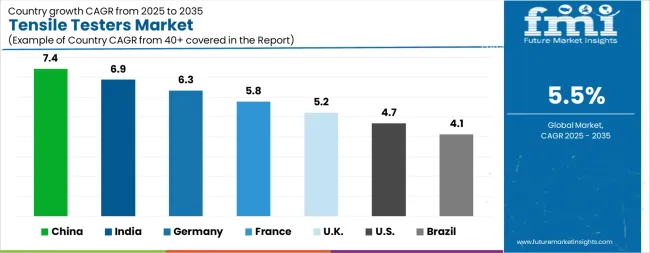
| Country | CAGR |
|---|---|
| China | 7.4% |
| India | 6.9% |
| Germany | 6.3% |
| France | 5.8% |
| UK | 5.2% |
| USA | 4.7% |
| Brazil | 4.1% |
The Tensile Testers Market is expected to register a CAGR of 5.5% during the forecast period, exhibiting varied country level momentum. China leads with the highest CAGR of 7.4%, followed by India at 6.9%. Developed markets such as Germany, France, and the UK continue to expand steadily, while the USA is likely to grow at consistent rates. Brazil posts the lowest CAGR at 4.1%, yet still underscores a broadly positive trajectory for the global Tensile Testers Market. In 2024, Germany held a dominant revenue in the Western Europe market and is expected to grow with a CAGR of 6.3%. The USATensile Testers Market is estimated to be valued at USD 98.7 million in 2025 and is anticipated to reach a valuation of USD 155.9 million by 2035. Sales are projected to rise at a CAGR of 4.7% over the forecast period between 2025 and 2035. While Japan and South Korea markets are estimated to be valued at USD 12.5 million and USD 8.4 million respectively in 2025.
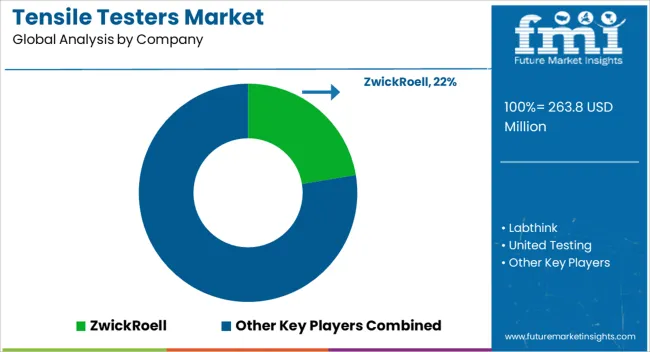
| Item | Value |
|---|---|
| Quantitative Units | USD 263.8 Million |
| Product Type | Universal Testing Machine, Electronic, Electromechanical, Digital, and Others |
| Component | Solution and Services |
| Application | Tension Testing, Compression Testing, Torque Testing, Flexure Testing, Coefficient Of Friction Testing, Crimp Joint Testing, Shear Testing, Peel Testing, Tear Testing, Crush Testing, Top-Load And Closure Testing, and Others |
| End Users | Quality Control Laboratories, R&D Centers, Metal Industries, and Others |
| Sales Channels | Distributors And Resellers, Original Equipment Manufacturers, and Online & Retail Stores |
| Verticals | Manufacturing, Mining, Energy And Utility, Government, Education, Construction, and Others |
| Enterprise Size | Large Enterprise and SMEs |
| Regions Covered | North America, Europe, Asia-Pacific, Latin America, Middle East & Africa |
| Country Covered | United States, Canada, Germany, France, United Kingdom, China, Japan, India, Brazil, South Africa |
| Key Companies Profiled | ZwickRoell, Labthink, United Testing, AMETEK, ADMET, Testing Machines Inc., Rycobel, TestResourcesInc., Kumagai Riki Kogyo Co.Ltd., TESTEX, and Tester Sangyo CO |
The global tensile testers market is estimated to be valued at USD 263.8 million in 2025.
The market size for the tensile testers market is projected to reach USD 450.5 million by 2035.
The tensile testers market is expected to grow at a 5.5% CAGR between 2025 and 2035.
The key product types in tensile testers market are universal testing machine, electronic, electromechanical, digital and others.
In terms of component, solution segment to command 58.3% share in the tensile testers market in 2025.






Our Research Products

The "Full Research Suite" delivers actionable market intel, deep dives on markets or technologies, so clients act faster, cut risk, and unlock growth.

The Leaderboard benchmarks and ranks top vendors, classifying them as Established Leaders, Leading Challengers, or Disruptors & Challengers.

Locates where complements amplify value and substitutes erode it, forecasting net impact by horizon

We deliver granular, decision-grade intel: market sizing, 5-year forecasts, pricing, adoption, usage, revenue, and operational KPIs—plus competitor tracking, regulation, and value chains—across 60 countries broadly.

Spot the shifts before they hit your P&L. We track inflection points, adoption curves, pricing moves, and ecosystem plays to show where demand is heading, why it is changing, and what to do next across high-growth markets and disruptive tech

Real-time reads of user behavior. We track shifting priorities, perceptions of today’s and next-gen services, and provider experience, then pace how fast tech moves from trial to adoption, blending buyer, consumer, and channel inputs with social signals (#WhySwitch, #UX).

Partner with our analyst team to build a custom report designed around your business priorities. From analysing market trends to assessing competitors or crafting bespoke datasets, we tailor insights to your needs.
Supplier Intelligence
Discovery & Profiling
Capacity & Footprint
Performance & Risk
Compliance & Governance
Commercial Readiness
Who Supplies Whom
Scorecards & Shortlists
Playbooks & Docs
Category Intelligence
Definition & Scope
Demand & Use Cases
Cost Drivers
Market Structure
Supply Chain Map
Trade & Policy
Operating Norms
Deliverables
Buyer Intelligence
Account Basics
Spend & Scope
Procurement Model
Vendor Requirements
Terms & Policies
Entry Strategy
Pain Points & Triggers
Outputs
Pricing Analysis
Benchmarks
Trends
Should-Cost
Indexation
Landed Cost
Commercial Terms
Deliverables
Brand Analysis
Positioning & Value Prop
Share & Presence
Customer Evidence
Go-to-Market
Digital & Reputation
Compliance & Trust
KPIs & Gaps
Outputs
Full Research Suite comprises of:
Market outlook & trends analysis
Interviews & case studies
Strategic recommendations
Vendor profiles & capabilities analysis
5-year forecasts
8 regions and 60+ country-level data splits
Market segment data splits
12 months of continuous data updates
DELIVERED AS:
PDF EXCEL ONLINE
Tensile Testing Machine Market Size and Share Forecast Outlook 2025 to 2035
Tensile Roof Fabrics Market Analysis – Size, Share, and Forecast Outlook 2025 to 2035
Pump Testers Market Size and Share Forecast Outlook 2025 to 2035
Torque Testers Market
Humidity Testers Market Size and Share Forecast Outlook 2025 to 2035
Concrete Testers Market Growth – Trends & Forecast 2025-2035
Compression Testers Market Size and Share Forecast Outlook 2025 to 2035
Smart-Cap UV Testers Market Analysis - Size and Share Forecast Outlook 2025 to 2035
Tablet Hardness Testers Market Size and Share Forecast Outlook 2025 to 2035
Non Destructive Testers (NDT) Equipment Market Size and Share Forecast Outlook 2025 to 2035
Vehicle Emission Testers Market
Ground Resistance Testers Market Growth - Trends & Forecast 2025 to 2035
Creep and Stress Rupture Testers Market Size and Share Forecast Outlook 2025 to 2035

Thank you!
You will receive an email from our Business Development Manager. Please be sure to check your SPAM/JUNK folder too.
Chat With
MaRIA